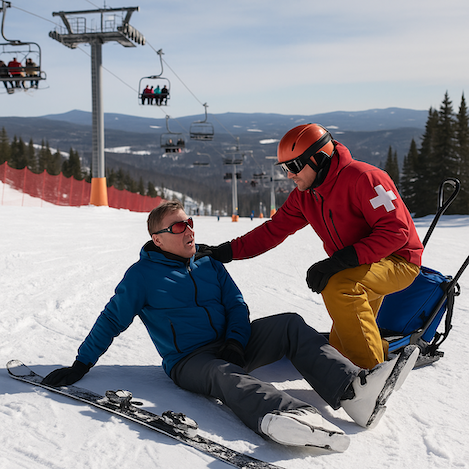What If I’m Injured Skiing at a Maine Resort?

Maine winters draw thousands of locals and visitors to the slopes every year. From the wide-open trails of Sugarloaf to the family-friendly runs at Sunday River and Camden Snow Bowl, skiing and snowboarding are a way of life here. But when the fun ends in an ambulance ride, many injured guests find themselves asking a difficult question: Who’s responsible when an accident happens at a Maine ski resort?
The answer depends on how the crash occurred, what caused your injuries, and whether negligence played a role.
The Hidden Risks Behind a Day on the Slopes
Skiing and snowboarding are inherently risky sports — that much is true. You accept some level of danger every time you step into your bindings. But not every injury comes down to “just bad luck.”
Many serious ski resort injuries happen because someone else failed to do their job safely. Common examples include:
- Poorly marked or hidden hazards (exposed pipes, rocks, or artificial obstacles)
- Chairlift or conveyor malfunctions caused by faulty maintenance
- Snowmobile or grooming collisions on active trails
- Inadequate signage or barriers near closed areas
- Negligent instruction from ski school staff
- Defective rental equipment
When resorts fail to follow safety standards or take shortcuts with maintenance, guests can pay the price with broken bones, concussions, spinal injuries, or worse.
Do Liability Waivers Mean You Can’t Sue?
Before hitting the slopes, most skiers sign a waiver or purchase a lift ticket that includes fine-print language about “assuming the inherent risks of skiing.” These waivers are meant to protect the resort — but they’re not bulletproof.
Under Maine law, a liability waiver does not shield a business from its own negligence. In other words, if your injury happened because a resort employee, manager, or equipment provider acted carelessly, that waiver may not apply.
For instance:
- If a lift operator failed to stop the chair when a rider fell — that’s negligence.
- If a resort ignored reports about faulty bindings or an unsafe terrain park — that’s negligence.
- If the resort allowed snowmobiles to cross an active beginner trail without warning signs — that’s negligence.
Maine courts have long recognized that while you accept the natural risks of skiing, you do not agree to accept someone else’s reckless or careless conduct.
When Another Skier or Snowboarder Is at Fault
Not all resort accidents involve the resort itself. Sometimes, another skier causes a collision — maybe they cut across your path or sped out of control on a crowded slope.
If another guest’s reckless behavior caused your injury, you can pursue a personal injury claim against that individual. Skiers have a duty to stay in control and avoid hitting others. If they violate that duty, they’re responsible for the harm they cause.
These cases often involve:
- Witness statements from nearby skiers
- GoPro or smartphone footage
- Ski patrol reports and on-site documentation
An experienced attorney can help identify the at-fault person and pursue their insurance coverage.
What to Do Immediately After a Ski Resort Accident
If you’re injured on the mountain, the steps you take in the next few hours matter:
- Get Medical Attention Right Away – Ski patrol should evaluate you immediately. Even if you can walk away, many injuries (like concussions or internal bleeding) don’t show up until later.
- Report the Incident – Notify ski patrol or resort management before leaving. Get a copy of their incident report if possible.
- Document the Scene – Take photos or videos of the area, the hazard, any signage, and your equipment.
- Collect Witness Information – Other skiers or staff may have seen what happened.
- Avoid Giving a Statement to the Resort’s Insurance Company – Their goal is to minimize payouts. Politely decline until you’ve spoken with a lawyer.
- Contact a Maine Personal Injury Attorney – The sooner you call, the easier it is to preserve evidence and build your case.
How a Maine Ski Accident Lawyer Can Help
Ski resort injury cases are complex. Resorts often claim that victims “assumed the risk” or blame unpredictable weather conditions. Meanwhile, corporate insurers may delay or deny valid claims.
A skilled attorney can cut through these defenses by:
- Investigating maintenance logs and safety protocols
- Reviewing trail design and signage standards
- Interviewing staff, witnesses, and ski patrol
- Consulting with ski safety and mechanical experts
- Negotiating with insurers for full and fair compensation
You may be entitled to damages for:
- Medical bills and rehabilitation costs
- Lost income or reduced earning capacity
- Pain and suffering
- Permanent disability or disfigurement
At Peter Thompson & Associates, we’ve represented Maine residents and visitors in countless recreational injury cases — including ski and snowboarding accidents. We understand both the excitement of Maine’s outdoor culture and the serious impact of resort negligence.
Don’t Let Negligence Ruin Your Season
You shouldn’t have to bear the financial burden of an accident caused by someone else’s carelessness. Whether your injuries happened at Sugarloaf, Sunday River, Saddleback, or another Maine mountain, you have rights under Maine law.
Our legal team can help you determine whether negligence played a role and fight for the compensation you deserve.
Contact Peter Thompson & Associates Today
If you or a loved one was injured at a Maine ski resort, don’t assume you signed away your rights. Call Peter Thompson & Associates for a free consultation. We’ll listen to your story, explain your options, and take action so you can focus on recovery — not paperwork.
Because when resorts cut corners, you deserve to hold them accountable.

